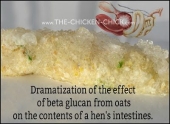








A piece of land is worth as much as the person farming it.
-Le Livre du Colon, 1902
 2
2








A piece of land is worth as much as the person farming it.
-Le Livre du Colon, 1902




Alex McQueen wrote:
I questioned her about soil diversity and killing it off. She says it's actually beneficial and also puts oxygen into the soil.
Anyone heard of this?

"Study books and observe nature; if they do not agree, throw away the books." ~ William A. Albrecht




A human being should be able to change a diaper, plan an invasion, butcher a hog, conn a ship, design a building, write a sonnet, balance accounts, build a wall, set a bone, comfort the dying, take orders, give orders, cooperate, act alone, solve equations, analyze a new problem, pitch manure, program a computer, cook a tasty meal, fight efficiently, die gallantly. Specialization is for insects.
-Robert A. Heinlein




A piece of land is worth as much as the person farming it.
-Le Livre du Colon, 1902




Life on a farm is a school of patience; you can't hurry the crops or make an ox in two days.
Henri Alain

 3
3




Alex McQueen wrote:My neighbour just built herself a greenhouse where her chickens used to be housed. She informed me that she's now watering the whole ground inside with peroxide to help kill off any molds or fungi because they're very common issues in greenhouses.
I questioned her about soil diversity and killing it off. She says it's actually beneficial and also puts oxygen into the soil.
Anyone heard of this?
List of Bryant RedHawk's Epic Soil Series Threads We love visitors, that's why we live in a secluded cabin deep in the woods. "Buzzard's Roost (Asnikiye Heca) Farm." Promoting permaculture to save our planet.




"Study books and observe nature; if they do not agree, throw away the books." ~ William A. Albrecht
 1
1




A piece of land is worth as much as the person farming it.
-Le Livre du Colon, 1902
 1
1




Standing on the shoulders of giants. Giants with dirt under their nails












 3
3




List of Bryant RedHawk's Epic Soil Series Threads We love visitors, that's why we live in a secluded cabin deep in the woods. "Buzzard's Roost (Asnikiye Heca) Farm." Promoting permaculture to save our planet.

| I agree. Here's the link: http://stoves2.com |


